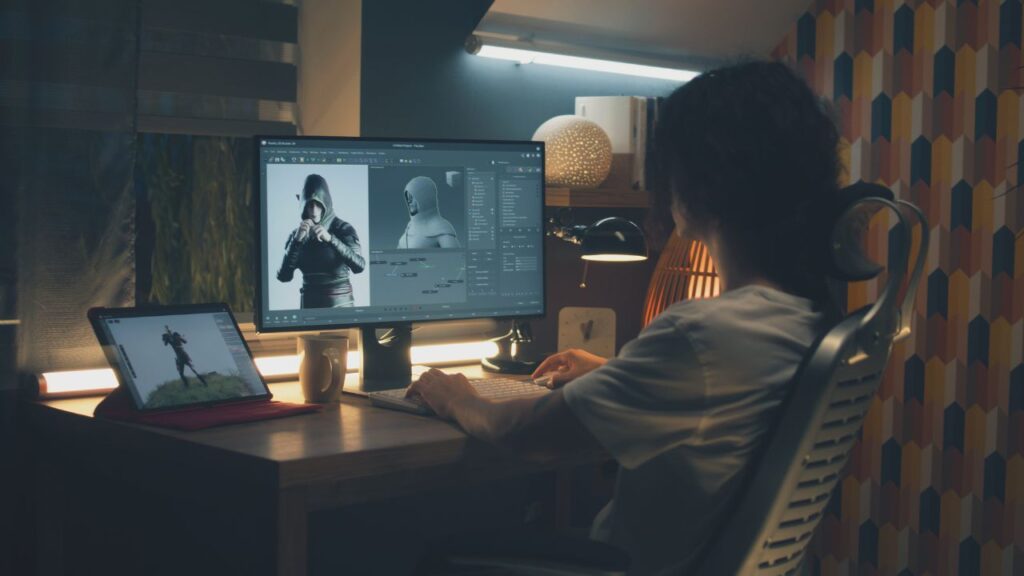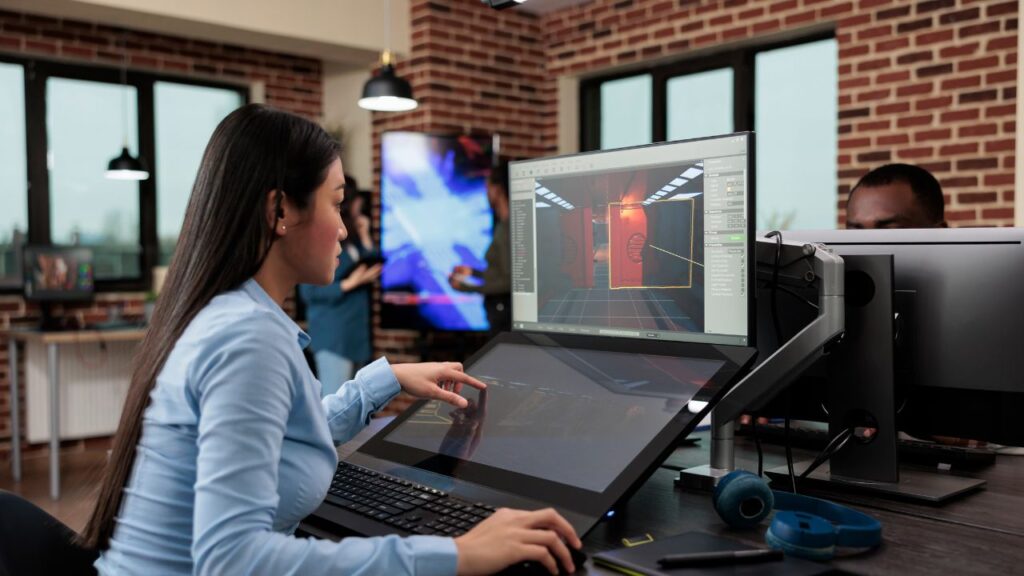Many people think game development means spending hours writing code, but that’s not the whole story. The gaming industry makes $184.4 billion each year and offers many different jobs that don’t require programming skills. Game development careers go far beyond coding and include roles in art, design, writing, marketing, project management, and testing that are just as important to creating great games.
People who love games but don’t want to code often feel stuck or think they can’t work in the industry. This isn’t true at all. Game studios need creative writers to build stories, artists to design characters, marketers to promote games, and project managers to keep everything running smoothly.
Whether someone enjoys creative work, managing teams, or connecting with players, there are many paths into game development. These non-coding roles are essential to making games successful and offer good pay and growth opportunities for people with the right skills and passion.
What Game Dev Careers Don’t Require Programming Skills?
Game development offers many career paths that don’t involve writing code. These roles focus on creative design, visual arts, storytelling, and audio production to bring games to life.
What Do Game Designers Actually Do?
Game designers create the core experience players enjoy. They build game mechanics, balance difficulty levels, and design how players interact with the world.
Level designers craft individual stages and environments. They place enemies, items, and obstacles to create fun challenges. Their work determines whether a level feels too easy or impossibly hard.
Systems designers focus on game rules and mechanics. They decide how combat works, what rewards players earn, and how different game elements connect together.
User experience (UX) designers make games easy to navigate. They design menus, create clear instructions, and ensure players understand how to play without getting confused.
Game designers use tools like:
- Flowcharts to map player decisions
- Prototypes to test ideas quickly
- Documentation to share ideas with the team
- Playtesting to see what works
How Important Are Artists in Game Development?
Visual artists create everything players see on screen. Without them, games would be blank screens with no characters, backgrounds, or effects.
Concept artists draw the first images of characters, creatures, and worlds. They help the team agree on how the game should look before anyone starts building it.
3D modelers turn drawings into digital objects. They create characters, buildings, vehicles, and props that move and interact in the game world.
Texture artists paint surfaces onto 3D models. They add details like scratches on armor, bark on trees, and fabric patterns on clothing.
Animators make characters and objects move naturally. They create walking cycles, fighting moves, and facial expressions that bring digital characters to life.
UI artists design buttons, health bars, and menu screens. They make sure all interface elements match the game’s visual style.
Who Creates Game Sounds and Music?
Audio professionals build the complete sound world that players hear. They create music, sound effects, and voice recordings that match the game’s mood.
Sound designers create individual audio effects. They record real sounds like footsteps, explosions, and door creaks. They also make fantasy sounds for magic spells and alien creatures.
Composers write original music for games. They create background tracks, victory themes, and dramatic music for boss fights. Game music must loop smoothly and change based on player actions.
Audio engineers put all sounds into the game. They balance volume levels, add echo effects, and make sure audio plays at the right moments.
Voice actors bring characters to life through dialogue. Audio directors guide these performances and ensure all voices fit the game’s story.
What Role Do Writers Play in Games?
Narrative designers create the stories that give games meaning. They write dialogue, build character backgrounds, and plan how stories unfold based on player choices.
Scriptwriters focus on character conversations and cutscenes. They write the actual words players read or hear during the game.
Lore writers build the game’s background history and world details. They create fictional cultures, languages, and mythologies that make game worlds feel real.
Technical writers create instruction manuals, help screens, and tutorial text. They explain complex game systems in simple terms that all players can understand.
Writers work closely with designers to ensure stories support gameplay. They adapt their writing style to match different game genres and target audiences.
What Skills Do You Need to Break Into Non-Coding Game Jobs?
Success in non-coding game careers requires building the right skills, creating strong portfolios, and making connections with industry professionals. Most positions focus on creativity, communication, and understanding what makes games fun.
How Do You Build a Portfolio That Gets Noticed?
A strong portfolio shows real work examples that match the job you want. Game designers should include game documents, level designs, and playable prototypes made with tools like Unity or Unreal Engine.
Artists need to show 3D models, concept art, or animations that fit different game styles. Include fan art of popular games or original characters to show your range.
Sound designers should create audio reels with music tracks, sound effects, and voice work. Show how sounds change based on game events or player actions.
Writers can write character backstories, dialogue samples, or quest descriptions. Create writing samples for different game genres like RPGs, adventure games, or mobile games.
Keep portfolios updated with your best work only. Remove older pieces that don’t show your current skill level.
Why Is Networking So Important in Game Development?
The game industry runs on relationships and word-of-mouth recommendations. Many job openings never get posted publicly because studios hire people they already know.
Attend game conferences like GDC, PAX, or local game meetups. These events let you meet developers, show your work, and learn about new job openings.
Join online communities on Discord, Reddit, or specialized forums for your field. Share your work, give feedback to others, and build friendships with other developers.
Follow industry professionals on social media platforms like Twitter or LinkedIn. Comment on their posts and share helpful content to get noticed.
Apply for internships or volunteer for indie game projects. This gives you real experience and helps you meet people in the industry.
What Tools and Skills Matter Most for Each Role?
Different non-coding roles need specific software and abilities. Game designers should learn design tools like Figma for wireframes and basic scripting in visual editors.
3D artists need Maya, Blender, or 3ds Max for modeling. Learn texture creation in Substance Painter and understand how art works in game engines.
Sound designers should master audio software like Pro Tools, Audacity, or FL Studio. Learn how to implement audio in game engines like Unity or Unreal.
Writers need strong grammar skills and understanding of interactive storytelling. Learn dialogue systems and how branching narratives work in games.
Soft skills matter just as much as technical ones. Good communication helps you work with team members from different departments. Problem-solving skills help you find creative solutions when projects face challenges.
Time management keeps you meeting deadlines in fast-paced development cycles. Most game projects have tight schedules and multiple moving parts.



